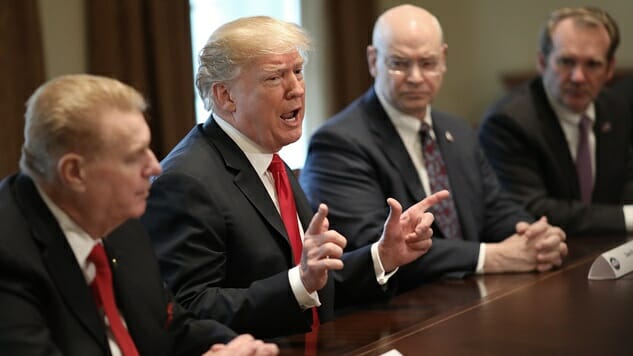Republicans Fear Trump’s Tariffs Could “Undercut” Re-Election Efforts
Photo by Win McNamee/Getty
President Trump’s announcement of tariffs on imported steel and aluminum seemingly came out of nowhere, and Saturday’s comments alluding to increased taxation on European-made cars doubled down on the unpopular decision. Now, incumbent Republicans are growing more worried that the president’s recent proclamations on trade could derail the party’s attempt to maintain its congressional majorities ahead of the 2018 midterm elections.
The main fear growing within the GOP is that any benefit the party could tout as a result of the widely-derided tax cut could be “undercut” by the proposed 25 percent tariff on steel imports and 10 percent tariff on aluminum imports. “American manufacturers, businesses and consumers would be forced to bear the brunt,” said Sen. Orrin Hatch, chairman of the Senate Finance Committee, adding, “Such action could very well undercut the benefits of the pro-growth tax reform we fought to get on the books.”
Past the expected rise in price for steel and aluminum products, the potential loss of jobs poses the largest impact to an American economy that has been trending down over the past few weeks, even before Trump’s desire for a trade war emerged. In a CNBC Op-Ed, Trump allies Larry Kudlow, Arthur Laffer and Stephen Moore relayed the point that “even if tariffs save every one of the 140,000 or so steel jobs in America, it puts at risk five million manufacturing and related jobs in industries that use steel.”
If the expected financial and employment ramifications of Trump’s proposed tariffs come to fruition, the GOP would have substantially less political ammunition to utilize against surging Democratic support on the campaign trail. Things could get even worse if the European Union makes good on its threats to respond with its own trade regulations on American exports. According to Politico, the EU is already targeting goods produced in key swing states, such as Florida oranges and Wisconsin-based Harley-Davidson.
-

-

-

-

-

-

-

-

-

-

-

-

-

-

-

-

-

-

-

-

-

-

-

-

-

-

-

-

-

-

-

-

-

-

-

-

-

-

-

-








































